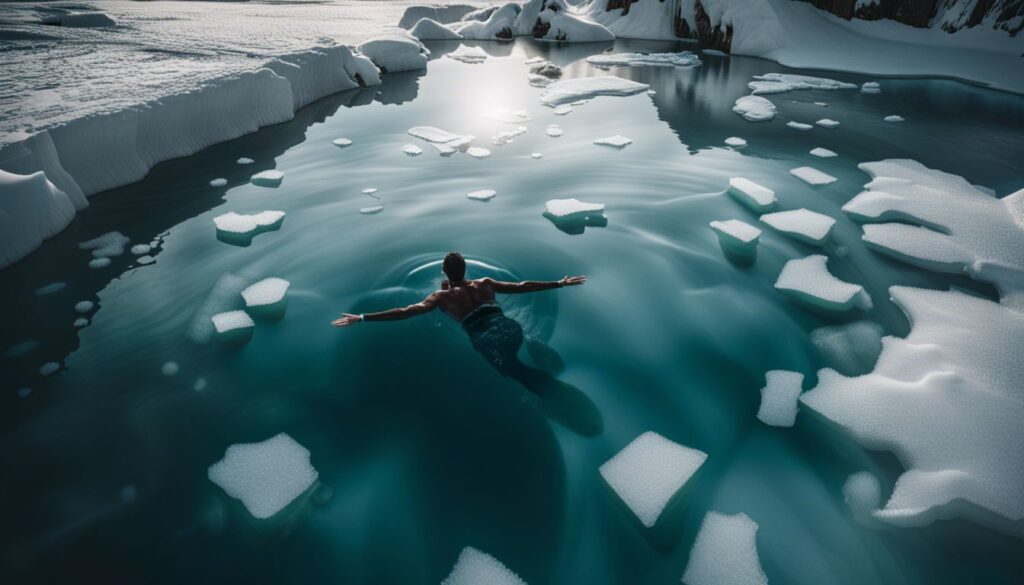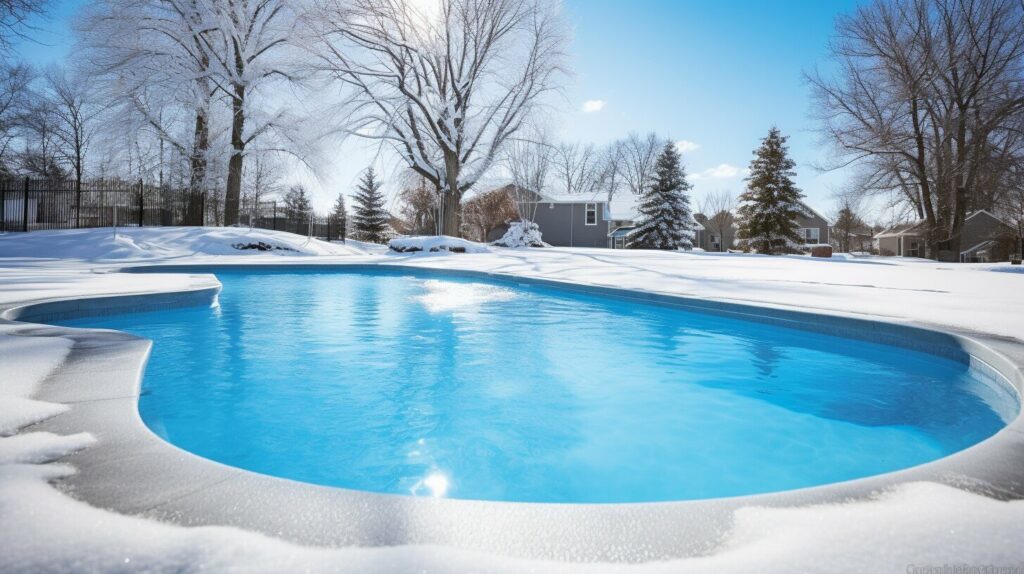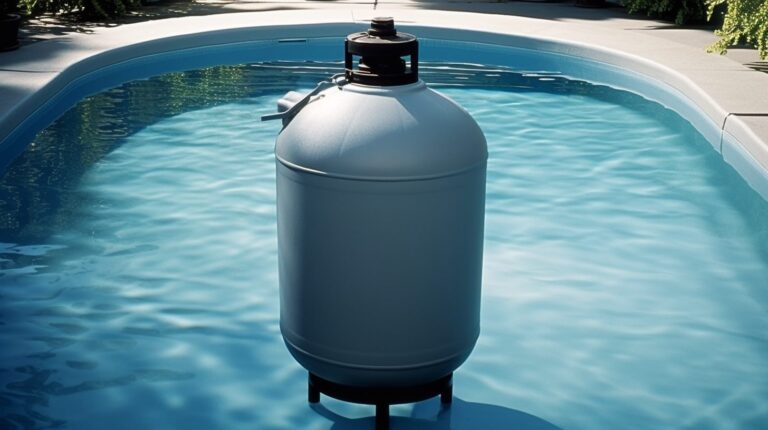Will A Salt Water Pool Freeze
Will A Salt Water Pool Freeze
Will a salt water pool freeze? Dipping into a crisp, saltwater pool is refreshing, but have you wondered what happens when winter rolls around? Did you know that saltwater pools freeze at a colder temperature than regular pools? This post will guide you through the ins and outs of saltwater pool behavior in cold weather.
Stick with us—we’re about to dive deep into an icy topic!
Key Takeaways
- Saltwater pools have a lower freezing point than regular chlorinated pools, with the freezing point typically around 28°F.
- Even though salt lowers the freezing point, saltwater pools can freeze if the temperature drops below 28°F.
- Freezing can cause serious damage to a saltwater pool’s equipment and structure, including cracked salt cells, damaged filters and plumbing, and potential leaks in the pool liner.
- To prevent freeze damage, it is important to properly winterize a saltwater pool by cleaning debris, adjusting chemical levels, draining equipment, using winterizing plugs, and covering the pool with a durable cover. Regular maintenance checks should also be done throughout the winter season.
Understanding the Freezing Point of a Saltwater Pool
A saltwater pool differs from a regular pool because it uses a salt generator to convert salt into chlorine, eliminating the need for traditional chlorine tablets. The freezing point of water is typically 32° F, but adding salt lowers this freezing point.
How does a saltwater pool differ from a regular pool?
A saltwater pool stands apart from a traditional chlorine one in several ways, primarily in keeping the water clean. A typical chlorine pool relies on manually adding chemicals to sanitize the water.
On the flip side, a saltwater pool utilizes a unique salt cell system that breaks down salt molecules to generate its safe amounts of chlorine, eliminating the need for manual chemical introduction.
This constant generation of fresh sanitizer gives these pools an edge when maintaining consistent free-chlorine levels compared to their intermittently chlorinated counterparts.
However, don’t be mistaken that they harbor ocean-like salinity; their salt concentration is about one-tenth that of seawater! It’s also worth mentioning that caring for such pools in winter calls for unusual steps because lower temperatures cause their generators to shut down so they can’t break down any more salts below 60° F.
Interesting right? Don’t mistake them for being freeze-resistant: even though their freezing point sits slightly lower at around 28°F due to added salts, they still turn into ice under harsh cold snaps!

What is the freezing point of water?
Understanding the freezing point of water is crucial when discussing whether a saltwater pool would freeze. Freshwater freezes at 0° Celsius or 32° Fahrenheit without impurities or additional substances like salt.
This specific temperature represents the point at which water molecules slow down in their movement and begin to form a solid structure known as ice. All new pool owners must grasp because different factors can alter this standard freezing point of water, including adding substances like salt.
So, while your garden hose may freeze solid on a cold winter morning at exactly 32° F, don’t expect your pool to do the same if it’s filled with salty water instead!
The effect of salt on the freezing point of water
Salt significantly influences the freezing point of water. Essentially, it lowers this point, making the liquid turn into solid ice at a colder temperature than normal freshwater – around -1.8°C or 28.8°F for ocean water with salt levels.
This phenomenon is known as “freezing point depression.” The more concentrated the salt in the water, the lower its freezing point. For instance, brine droplets freeze at least 15°C lower when their salt concentration rises.
– The temperature at which a saltwater pool freezes can vary, but generally, it will freeze if it drops below 28° F.
However, remember that your average home swimming pool contains only a fraction of the salinity of ocean water. So even though your saltwater pool has a reduced risk of freezing compared to traditional chlorine pools during cold snaps and cold winter months due to salt’s distinct properties, beware that they can still freeze under certain conditions! Its impact on raising or lowering temperatures isn’t enough when facing extremely low temperatures without any protection, such as using a well-maintained pool cover or operating an effective heater system.

Factors Affecting the Freezing of a Saltwater Pool
– If a saltwater pool freezes, it can cause damage to the pool equipment and infrastructure.
– Assessing the damage caused by freezing is important to determine what repairs are needed.
The temperature at which a pool freezes
A pool can freeze when the temperature drops below 32° F (0°C). However, it is important to note that a saltwater pool has a lower freezing point than a regular chlorinated pool.
While a traditional pool freezes at around 32° F, a saltwater pool can freeze at about 28° F. This means that owners of saltwater pools should be extra cautious during colder months or when there are cold snaps, as the risk of freezing and potential damage increases.
Pool owners must monitor the outdoor air temperature and take appropriate measures to protect their pools from freezing temperatures.
What happens if a saltwater pool freezes?
If a saltwater pool freezes, it can cause serious damage to the pool’s equipment and structure. When water freezes, it expands, leading to pipes bursting, concrete cracking, and damage to pumps, filters, and heaters.
This can result in costly repairs for pool owners. The frozen water may also create an ice sheet on the pool’s surface, potentially damaging the liner.
Saltwater pool owners must take precautions during colder months to prevent their pools from freezing and suffering from these detrimental effects.
Assessing the damage caused by freezing
- Cracked salt cell: A cracked salt cell is the most common damage caused by freezing temperatures in a saltwater pool. This can lead to costly repairs and replacement.
- Pool filters: Freeze damage can also affect pool filters, with any cracks indicating the need for replacement. It’s important to check these carefully after freezing temperatures.
- Pipes and plumbing: When water freezes, it can generate enough force to split pipes, crack concrete, and damage pumps, filters, and heaters. Assessing the condition of your pipes and plumbing is crucial after a freeze.
- Pool equipment: Check your pool pump, heater, and other equipment for any signs of damage due to freezing. Look for cracks or leaks that may have occurred during the cold weather.
- Pool liner: Examine the bottom of the pool and the perimeter tile band for any tears or damage to the liner. Freezing temperatures can cause liners to shrink or become brittle, leading to potential leaks.
- Water chemistry: Freezing temperatures can also affect your pool’s water chemistry. After a freeze, test the water levels for pH balance, total alkalinity, and calcium hardness. Adjustments may be necessary.
- Water features: If you have water features such as fountains or waterfalls, check them for freeze damage. Look for cracks or leaks that may have occurred during cold weather.
- Other components: Inspect return lines, pump baskets, skimmers, and other parts of your pool system for any signs of freeze damage. Look for cracks or leaks that may have developed due to freezing temperatures.
Remember to consult your manufacturer’s instructions and contact pool professionals if you suspect any significant freeze damage to prevent further issues.
Tips to Prevent a Saltwater Pool from Freezing
Winterizing a saltwater pool is crucial to prevent freezing and potential damage. This includes draining the pool partially, protecting equipment from cold temperatures, and using a pool cover.
Read more for essential tips on how to keep your saltwater pool safe during the winter months!
Winterizing a saltwater pool
To ensure your saltwater pool is protected during the colder months and to prevent freezing, follow these winterizing steps:
- Clean the pool thoroughly: Remove debris, leaves, and dirt using a skimmer net or vacuum. This will help prevent clogging and damage to your pool equipment.
- Check salt levels and pH balances: Before closing your pool for winter, test the water for salt levels and pH balances. Adjust them accordingly to ensure proper chemical balance during the off-season.
- Add winter chemicals: To keep your pool water safe and clean throughout winter, add winterizing chemicals such as algaecide and chlorine stabilizer. These chemicals will help prevent algae growth and protect your pool from potential damage.
- Lower the water level: Reduce the water level in your pool to just below the skimmer intake. This prevents freezing water from entering the skimmer pipes and causing damage.
- Drain all equipment: Drain all water from your pump, filter system, salt cell, and other equipment to prevent freezing and cracking. Follow the manufacturer’s instructions for proper drainage.
- Use winterizing plugs: Install winterizing plugs in your return lines, skimmers, pump baskets, and drain plugs to ensure no water can enter these areas during freezing temperatures.
- Cover your pool: Use a durable cover designed for winter to protect your saltwater pool from debris and retain heat during colder months.
- Consider additional freeze protection systems: If you live in an area with particularly cold temperatures or frequent freezes, investing in additional freeze protection systems such as floating chlorinators or heaters specifically designed for pools may be beneficial.
- Regular maintenance checks: Periodically check on your pool throughout winter to ensure that everything is functioning properly and that no damage or leaks occur.
Protecting the pool from freezing temperatures
To protect your saltwater pool from freezing temperatures, follow these steps:
- Add salt and a salt chlorinator winterizing kit to help maintain the proper chlorine levels in your pool during winter months.
- Keep the main pool pump running continuously while the temperature is below freezing to prevent water from freezing in the pipes.
- Maintain a clean pool by regularly skimming leaves and debris off the surface to prevent freezing water from damaging the pool equipment.
- Check and adjust the water level regularly, as low water levels can lead to freezing damage.
- Consider using a pool cover to help retain heat and prevent ice formation on the surface of your pool.
- Install freeze protection systems that use sensors to detect low temperatures and automatically turn on the pool pump to keep water moving and prevent freezing.
- Insulate exposed pipes or invest in pipe insulation sleeves to protect against freezing temperatures.
- If you live in an area with extremely cold winters, consider using portable gas heaters or other heating solutions to keep your pool warm during colder months.
- Consult the manufacturer’s instructions or seek advice from pool professionals for specific guidelines on protecting your saltwater pool during winter.
Preventing future damage
To prevent future damage to your saltwater pool, here are some important steps to follow:
- Balance the pool water: Properly balancing the water chemistry prevents freeze damage. Maintain the correct pH, alkalinity, and calcium hardness levels as your pool professional recommends.
- Lower the water level: Lowering the water level below the skimmer can help prevent freeze damage. This reduces the risk of ice expanding and causing damage to your pool equipment.
- Clear debris: Before winter hits, clear any debris from your pool. Leaves and other organic matter can decompose and negatively impact your pool’s water chemistry during colder months.
- Cover your pool: Invest in a high-quality pool cover that fits securely over your saltwater pool. This will provide extra protection against freezing temperatures and keep out debris.
- Use antifreeze: Consider adding swimming pool antifreeze to your plumbing lines and equipment as a preventive measure against freeze damage. Follow the manufacturer’s instructions on how much to use based on the size of your pool.
- Maintain equipment: Regularly inspect and maintain your pool equipment, including the salt cell, pump, filter system, and heater, if applicable. Any faulty or worn-out parts should be replaced before winter arrives.
- Be cautious with power outages: In case of a power outage during freezing weather, it’s important to take precautions to prevent freeze damage. Consider using portable gas heaters if necessary, or consult a professional for alternative heating options.
- Seek professional guidance: If you’re unsure how to winterize your saltwater pool properly or have specific concerns about freezing weather in your area, don’t hesitate to seek advice from a pool professional.
Benefits and Maintenance of a Saltwater Pool
Saltwater pools have several benefits, including less maintenance than traditional chlorine pools. The special maintenance and equipment required for saltwater pools may include a salt cell or chlorine generator, eliminating the need to add chlorine manually.
However, there are also disadvantages, such as the potential for costly repairs if the pool freezes during the winter months.
Benefits of a saltwater pool
- Saltwater pools are gentler on the body and clothing, as they have lower chlorine levels than traditional ones.
- Saltwater pools have no harsh chlorine smell, making the swimming experience more enjoyable.
- The water in saltwater pools is softer, which can benefit people with sensitive skin or allergies.
- Chlorine does not need to be stored in saltwater pools, reducing the risk of accidents and chemical exposure.
- Saltwater pools produce softer-feeling water, providing a more luxurious and comfortable swimming experience.
- Salt can be harmful to a pool over time, but with proper maintenance and monitoring, the potential damage can be minimized.
- Saltwater pools require less maintenance than chlorine pools, saving owners time and effort in maintaining the pool’s chemistry.
- The electrolytic chlorine generator in saltwater pools only adds chlorine as needed, ensuring the water remains properly sanitized without excess chemicals.
- The salt level in a saltwater pool is low enough that swimmers shouldn’t taste it.
- Overall, saltwater pools offer many benefits compared to traditional chlorine pools.

Special maintenance and equipment required
- Regular testing and balancing of chemicals is necessary to maintain proper water chemistry in a saltwater pool.
- A stabilizer is essential for a saltwater pool to withstand freezing temperatures.
- Specialized equipment, such as a pump or filter, may be required to regulate pH levels in saltwater pools.
- Understanding what a saltwater pool is and how to maintain it is crucial for keeping it clean.
- Today’s chlorine generators and testing equipment make saltwater pool maintenance simple.
- Saltwater pools are not considered high maintenance compared to traditional chlorine pools.
Disadvantages of a saltwater pool
- Saltwater pools require more maintenance compared to regular pools.
- Regular monitoring of chemical levels is necessary for proper maintenance of a saltwater pool.
- The initial investment for a saltwater pool is higher than that of a traditional pool.
- Over time, salt can cause erosion and buildup in the pool, leading to potential damage.
- Proper preparation for cold weather is essential to prevent costly freeze damage to a saltwater pool.
- Despite being less harsh on the skin and eyes than chlorine pools, saltwater pools still require maintenance to ensure water quality.
- While they may be considered more environmentally friendly, saltwater pools still impact the environment due to the use and disposal of salt.
Conclusion
In conclusion, saltwater pools have a lower freezing point than regular chlorinated pools but can freeze if left full during winter. Pool owners must take necessary precautions and winterize their saltwater pools to prevent costly freeze damage.
By following the proper maintenance guidelines and protecting their pool from freezing temperatures, saltwater pool owners can enjoy their pools year-round without any issues.
Useful Links for Further Information
Several helpful resources are available online if you want to learn more about preventing your saltwater pool from freezing and the best ways to winterize it. One great resource is an article on Pool Research, which provides tips on protecting your pool during cold weather and preventing freeze damage.
Another useful link is a blog post on Swim University, which offers detailed steps for winterizing a saltwater pool and includes recommendations for specific products to use. Additionally, the website Trouble Free Pool has an informative forum where you can find discussions and advice from experienced pool owners who have dealt with freezing issues.
These resources will give you valuable insights and guidance to ensure your saltwater pool remains safe and well-maintained throughout winter.
FAQs
Can a Salt Water Pool Freeze?
A saltwater pool can freeze. Much like traditional pools, when the water temperatures drop and stay below freezing for an extended duration, your salt pool may transform into a colossal collection of ice cubes.
What is the Aftermath of a Frozen Salt Water Pool?
When a saltwater pool freeze happens, the tranquil pool water hardens into ice. This can wreak havoc on your pool equipment and plumbing systems. The frozen water’s expansion may lead to fractures in the pool’s surface or walls. This is not a sight any new pool owner wishes to see.
How Can I Safeguard My Salt Water Pool from Freezing?
To protect your saltwater pool from the deep freeze of the cold months, it’s essential to winterize it. This includes draining and blowing out the pool lines using an air compressor or a shop vac. Further, eliminate excess water from the system and safeguard exposed parts using covers or insulation.
Do I Need to Run My Salt Cell in Winter to Prevent Freezing?
Keeping your salt cell running during winter is not a requirement, provided you’ve adequately winterized your pool. Running the salt cell during freezing temperatures might augment the risk of damage due to potential ice formation for inground or above-ground pools.
Should I Remove the Chlorinators from My Pool During Winter?
Yes, removing the floating and saltwater chlorinators from your pool during winter is advisable. This can help prevent damage caused by freezing temperatures.
Do I Need to Turn off Pool Heaters or Pumps in Winter?
Absolutely. You should turn off any pool heaters and variable speed pumps at the circuit breaker. This precaution can prevent potential damage from ice formation.
Can Air Pillows Help Protect My Above-Ground Pool in Winter?
Yes, adding air pillows under the cover of an above-ground pool can help alleviate pressure caused by freezing water on the pool walls. They act as a buffer to absorb the force of the expanding ice.
Are Weekly Pool Maintenance Services Beneficial in Winter?
Weekly pool maintenance services can be incredibly beneficial in winter. These services help ensure your pool, pool filter, and other equipment stay in good condition, mitigating the potential damage caused by freezing temperatures.
Can I Use Electric Heaters to Prevent Pool Freezing?
As an Amazon Associate, we recommend certain types of electric heaters for pool owners. These heaters can effectively maintain a warmer pool temperature and prevent freezing during the winter months.
Should I Add Antifreeze to My Pool Plumbing Lines in Winter?
After blowing out the pool lines, adding non-toxic antifreeze can provide additional protection from freezing. It’s also advised to cover the return fitting and keep an eye on the perimeter pool tile band for a thin ice sheet. This vigilance can be crucial in preventing significant winter damage.






